In 2022, I think you can say the same thing about expert roundups.
I’ll explain why below. But first, let’s make sure we’re on the same page…
- What are expert roundups?
- Why people create expert roundups
- Why “experts” contribute to expert roundups
- What’s the issue with expert roundups?
- Three better alternatives to expert roundups
Expert roundups are blog posts that feature quotes from industry experts about a specific topic.
For example, below is a roundup of SEO tips. You can see that it features quotes from 30+ experts, including some extremely well-known faces like Glen Allsopp and our very own Tim Soulo:
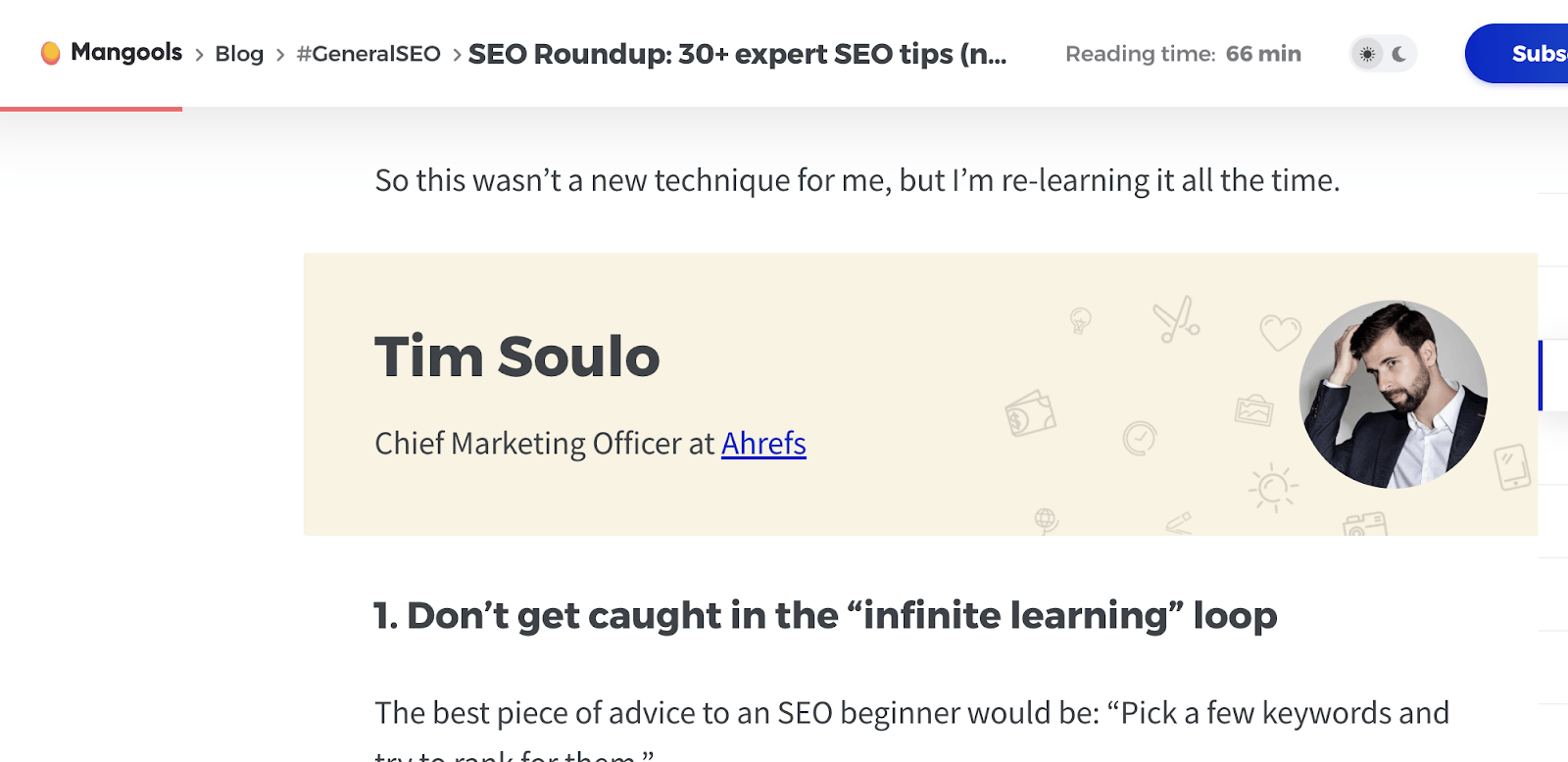
In my opinion, there are three main reasons:
- Exposure
- Backlinks
- Relationships
But rather than just share my opinion on the matter, I polled my Twitter followers.
Here are the results of the poll:
if you’ve ever produced an expert roundup, what was your primary aim with that?
— Joshua Hardwick (@JoshuaCHardwick) March 9, 2022
Let’s take a look at the results in more detail.
Backlinks
According to my poll, backlinks are the top reason for creating an expert roundup—with 43.9% of folks citing it as their primary aim.
The idea here is simple: If an “expert” is willing to contribute to your roundup, perhaps they’ll also be willing to link to it. This is good for SEO because backlinks are one of Google’s top-ranking factors.
Building relationships
Building relationships is the second most popular reason for creating an expert roundup, with 36.8% citing it as their primary aim.
This makes sense, as building relationships with influential and well-connected industry experts can open all kinds of doors. It’s how I managed to get a backlink from Glen Allsopp (Detailed) back in the day, and it’s kind of how I landed my job at Ahrefs.
Exposure
Exposure is the least popular reason for creating an expert roundup, with only 19.3% of respondents citing it as their primary aim.
People tend to share content that paints them in a positive light. So the idea with expert roundups is that, once published, many of the featured “experts” will share the post on social media and your blog will get some nice exposure.
It’s basically egobait. You’re literally referring to these people as experts in your content, so why wouldn’t they want to share it?
I also got a reply to my tweet from Jeremy Rivera, who gave a fourth reason for creating expert roundups: crafting expert-supported content:
You forgot a fourth objective; crafting quality expert supported content.
— Jeremy Rivera (@JeremyRiveraSEO) March 9, 2022
A well executed roundup can and should actually achieve ALL of these objectives!
This makes sense. But personally, I’m not convinced the “expert roundup” format is usually the best way to do this. (More on this later.)
Given that most “experts” are already well connected, they’re probably not contributing to roundups to build relationships. They’re almost certainly doing it for backlinks.
But again, let’s not trust my opinion…
I polled my Twitter followers. Here are the results:
if you’ve ever *contributed* (i.e., given a quote) to an expert roundup, what was your primary aim with that?
— Joshua Hardwick (@JoshuaCHardwick) March 11, 2022
No prizes for guessing the outcome here. I think it’s pretty much what we all expected.
Expert roundups have no real downsides for contributors. It rarely takes more than a few minutes to answer the creator’s question and, in return, they get exposure, a backlink, and a nice egoboost.
For example, here’s my contribution to an expert roundup. I was asked to name my top three keyword research tools:

In this case, replying to an email with six words landed me a mention and backlink on a DR71 site. The post I’m featured in now gets an estimated 284 organic monthly visits:
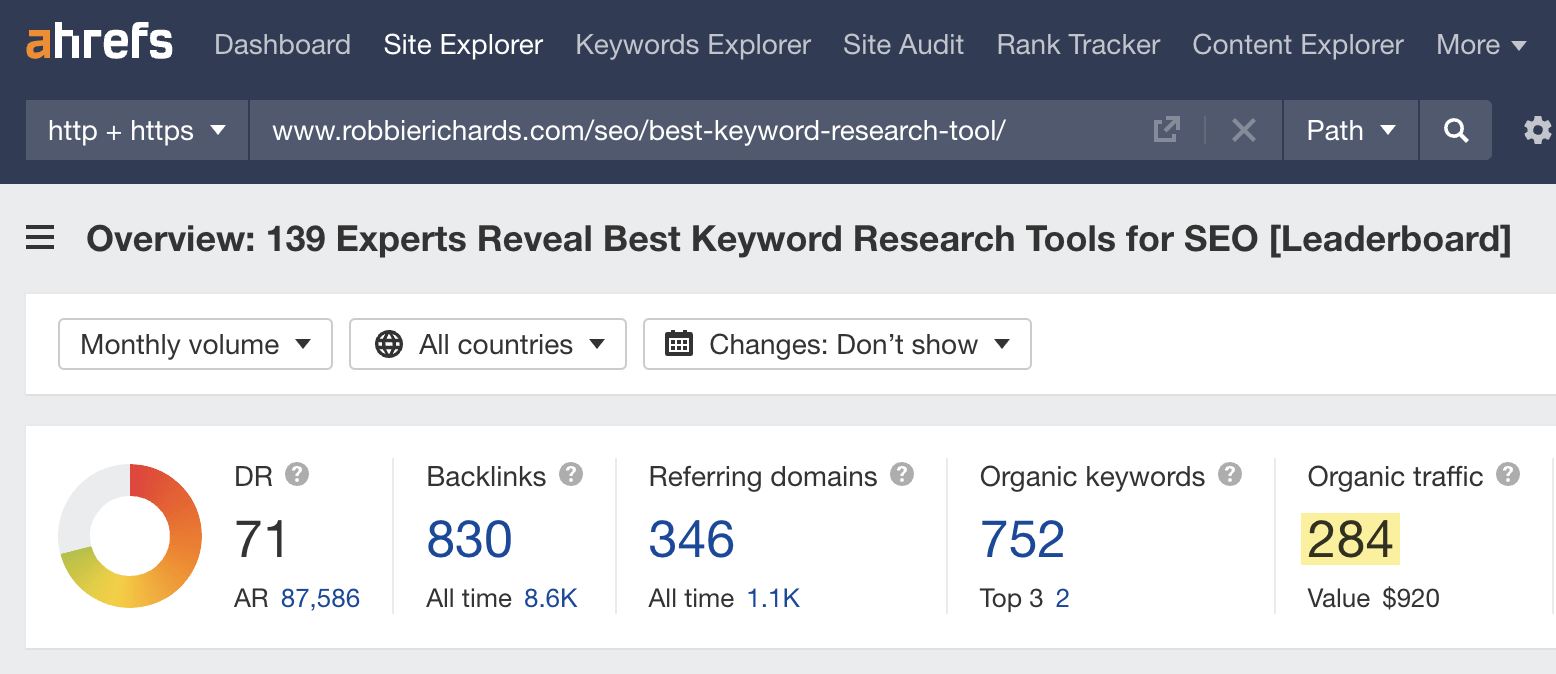
But for the creators and readers of roundups, there are a few issues…
1. It can be hard to get enough actual experts to contribute
In the early days of expert roundups, someone reaching out and asking for your contribution made you feel special because it didn’t happen often. Now, everyone is creating expert roundups, and genuine experts are inundated with requests.
This means they have to pick and choose which ones to contribute to, making things harder for publishers to get the quotes they need.
As a result, some publishers seem willing to accept quotes from, well, pretty much anyone.
Just look at this expert quote in a recent roundup I found about link building tactics:

Really? The best strategy for building backlinks is blog commenting, where 99% of links are nofollowed and almost certainly won’t pass much “authority” either way?
I can’t imagine anyone close to being a link building expert saying this in the last 10 years.
Now, I hold no grudges against the person who gave this quote. They were clearly asked and thought “why not?” But the reality is that including these kinds of quotes leads to a deterioration in the perceived quality of expert roundups over time—which further dissuades experts from contributing.
It’s a vicious cycle, and it’s why expert roundups have (in my opinion) become so spammy in recent years.
2. The format rarely aligns with search intent
People are typically looking to do one of three things when they type something into Google:
- Buy something
- Learn something
- Get somewhere (i.e., a specific website)
You may think that an expert roundup matches search intent when the searcher is looking to learn, but let me ask you this: How often do you really want a list of hundreds of random and potentially opposing opinions when you’re just trying to find the answer to something?
Probably not very often, which is why expert roundups are rarely an optimal content format if you want to rank high on Google.
3. Experts rarely link to roundups they’re featured in
If you’re publishing an expert roundup with the aim of attracting backlinks from contributors’ websites, I have bad news: Most experts probably aren’t going to link to your roundup.
How do I know? I cross-referenced the external links and referring domains to an expert roundup we published in 2015 to see how many of the featured experts linked to the roundup. I found the result to be 21%—or roughly 1 in 5.
That may not sound too shabby, but you have to remember a few things:
- We published this post when expert roundups were arguably at the height of their popularity.
- Pretty much everyone in the SEO industry wants to be featured on the Ahrefs blog, so being featured in our roundup is something to shout about.
- We already had relationships with many of the people who linked to us.
In other words, in 2022, unless you’re a well-known brand, this number is almost certainly going to be much lower.
My opinion: You may get 1 in 10 contributors to link to you—if you’re lucky.
4. Experts rarely share roundups they’re featured in
You’d think that sharing the roundup on Twitter would be a no-brainer for those featured. But it seems that very few do this either. I checked Twitter, and only a handful of those featured in our expert roundup appear to have shared it.
Even if they do, the reality is that their share is unlikely to send much (if any) traffic our way.
Don’t believe me? Here’s the number of link clicks a recent tweet of mine got:
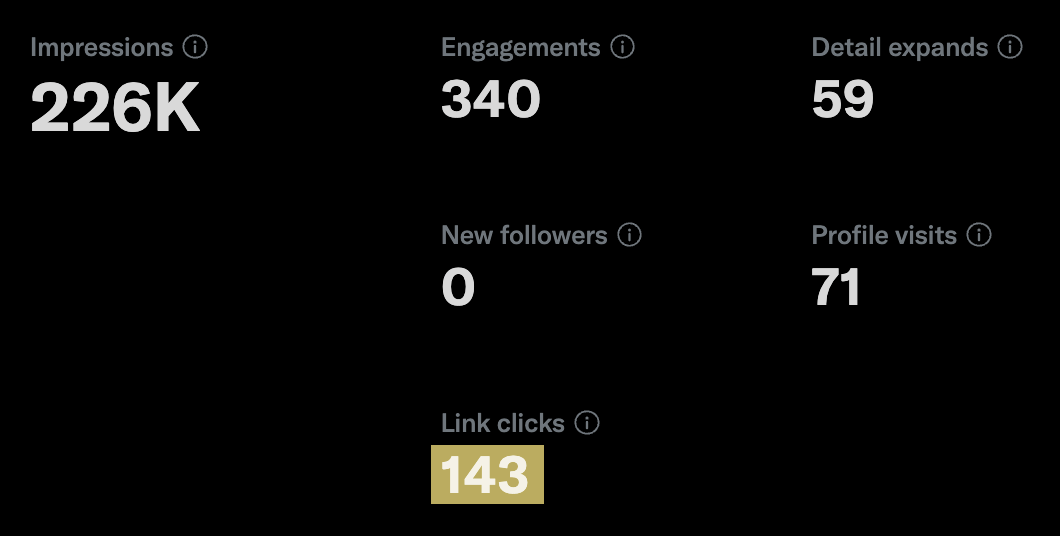
Again, the numbers may not look too bad. But here’s what it took to get those clicks:
- 8,000+ followers
- Retweets from the official Ahrefs account and two of my colleagues, which exposed my tweet to a further 135,000+ people.
Of course, true experts tend to have lots of followers too, but they rarely have the amplification of big brands like Ahrefs behind them.
All in all, it’s unlikely that you’ll get more than a handful of clicks from experts sharing your post on social media.
Expert roundups may have had their day, but there are still ways to utilize expert contributions to improve content and SEO. You just need to be a little more creative and put in more effort. Let’s look at a few ideas.
1. Interview an expert and write up their insights
If you want to write about a topic but lack the expertise to do so, consider interviewing an expert and writing up their insights.
This is precisely what we did for our post about Google penalties.

Having limited experience with Google penalties ourselves, we interviewed three experts on the topic, including Marie Haynes. We then compiled their knowledge and insights into a guide.
There are a few benefits to this approach:
- You can still match search intent – As you’re writing up expert insights, you’re free to use any content format you like. If search intent calls for a list of tips, you can write a list of tips. If it calls for a guide, you can write a guide.
- You improve E-A-T – E-A-T stands for expertise, authoritativeness, and trustworthiness. It’s what Google’s human quality raters use to assess the quality of search results. It’s not a direct ranking factor, but improving and demonstrating E-A-T can lead to many SEO benefits.
- Your expert is arguably more likely to share the content – Being included in an expert roundup among dozens of others may give you a bit of an egoboost, but having a piece centered almost entirely around your knowledge and insights will surely give you a bigger one. This will, thus, increase the chances of experts sharing the content.
If you’re not sure who to interview for your piece, run a search in Ahrefs’ Content Explorer.
The tool is a searchable database of over 9 billion pages, and it has authorship information for some of them. This means you can run a search to find prolific writers on a topic.
For example, if we want to write a piece about Google’s Knowledge Graph, we can search Content Explorer for the pages with “knowledge graph” in their titles.

If we then go to the “Authors” tab, we’ll see the names of authors who’ve published the most pages matching our search.
Here, we can see that Aaron Bradley has authored 12 pages with “knowledge graph” in each page’s title:

If we click on the number of pages, we can see everything he’s written on the topic:
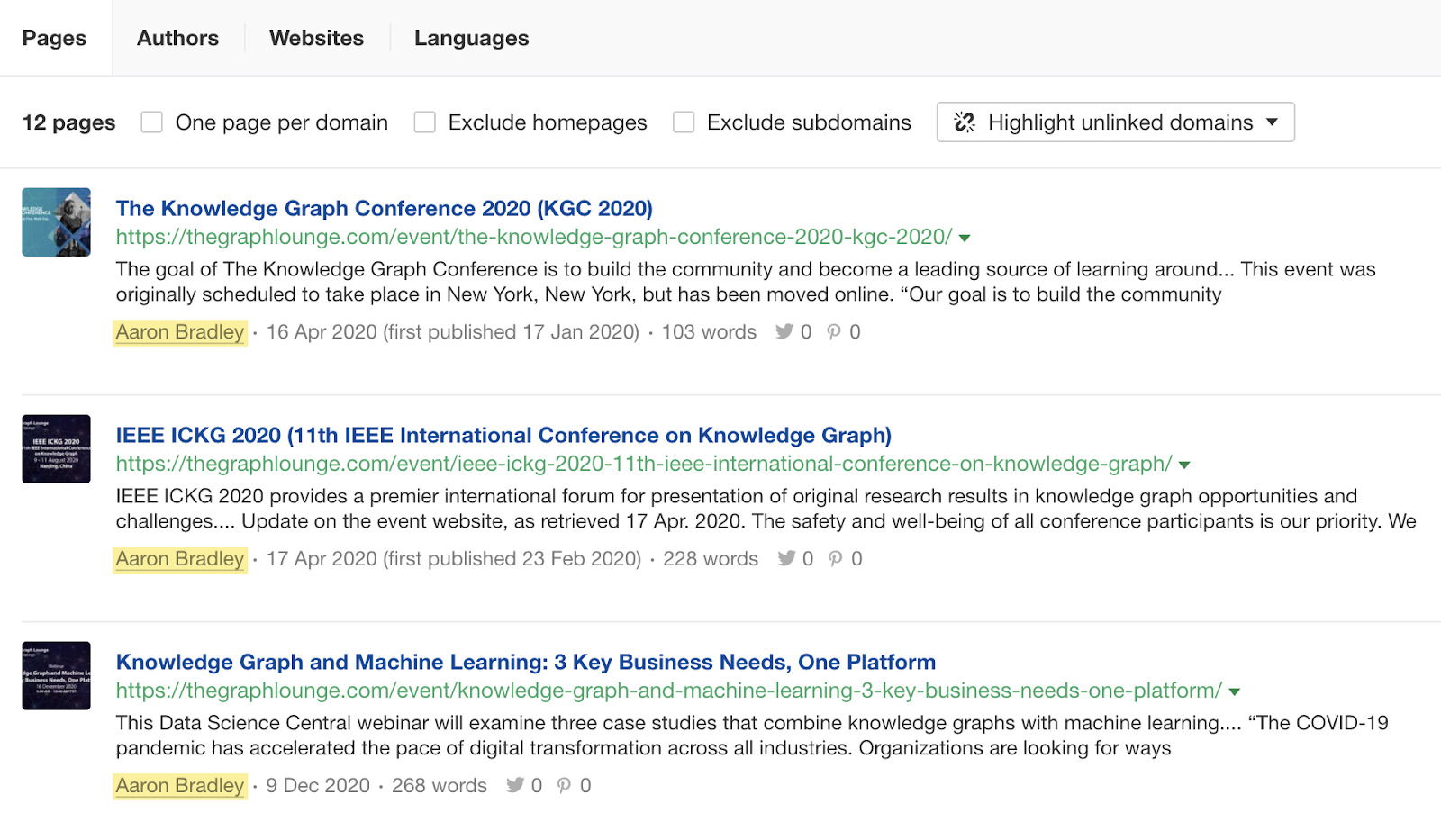
This guy clearly knows his stuff, so he is a fantastic person to interview for our article.
2. Poll experts for interesting stats
People often cite statistics and link to the source. If you don’t believe us, just look at the anchors and surrounding texts of backlinks to our search traffic study:
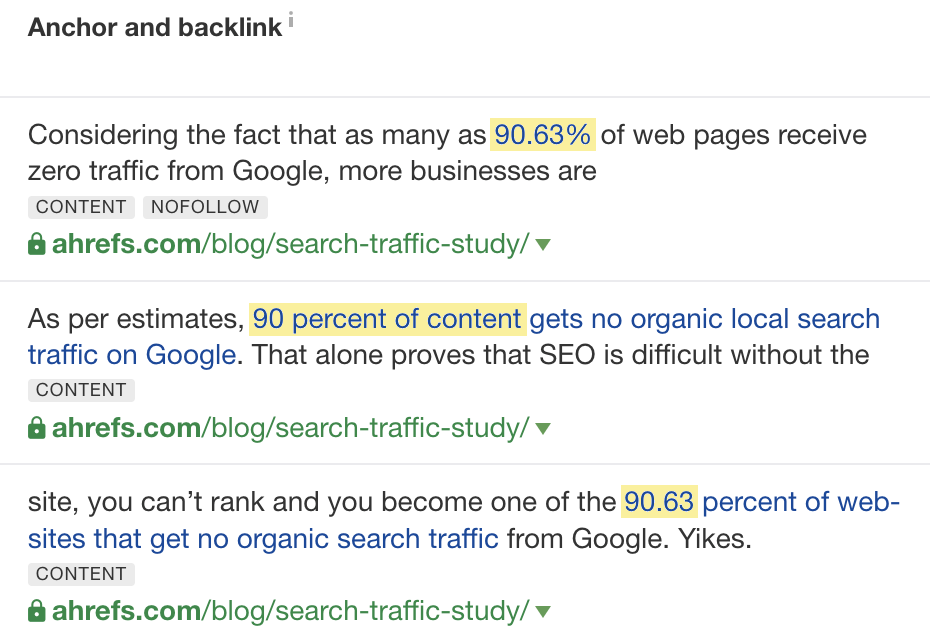
You can see that pretty much all of the links are from folks citing statistics on our page.
If you’re lucky enough to have access to unique data and insights as we are, publishing content laden with statistics is easy—and you’ll naturally earn backlinks as a result. But if you don’t have in-house data, a good way to create unique statistics is to poll experts.
This is precisely what Paddy Moogan did for Aira’s annual “state of link building” report.
He polled 250 digital marketing professionals and consolidated their responses into graphs like this:
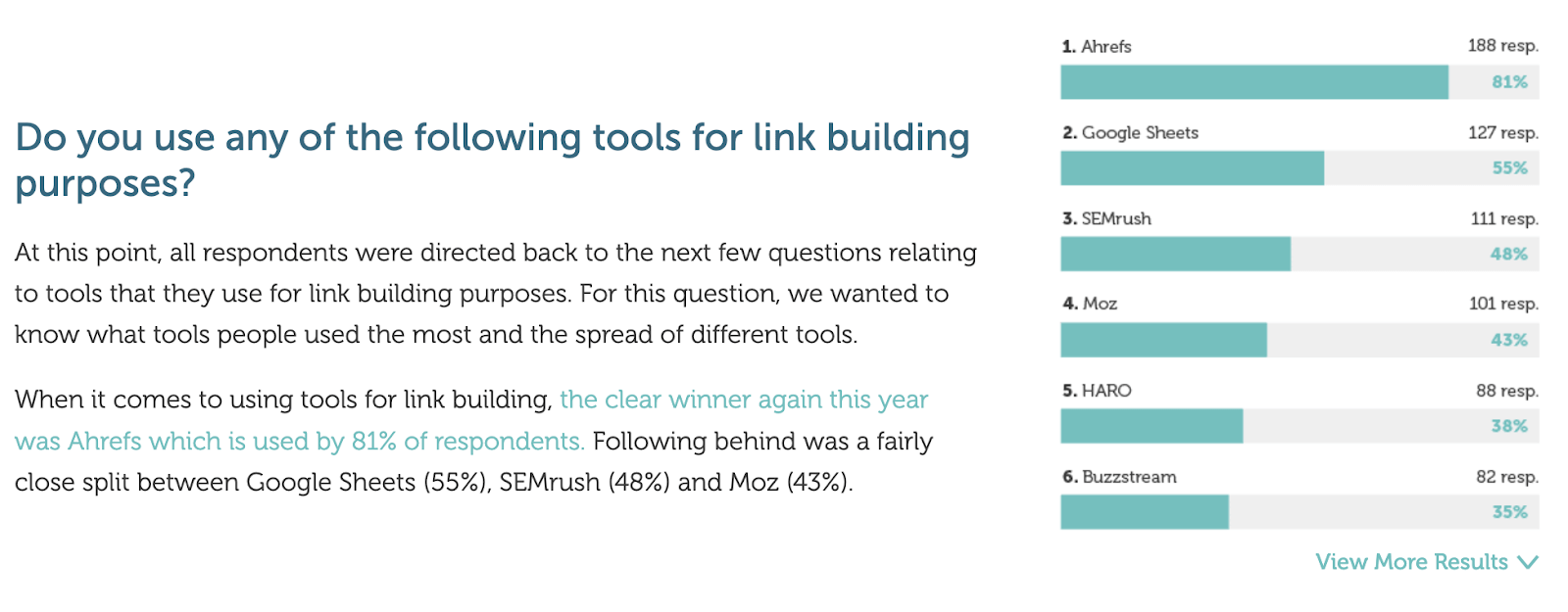
The result? Backlinks from 346 referring domains and counting.
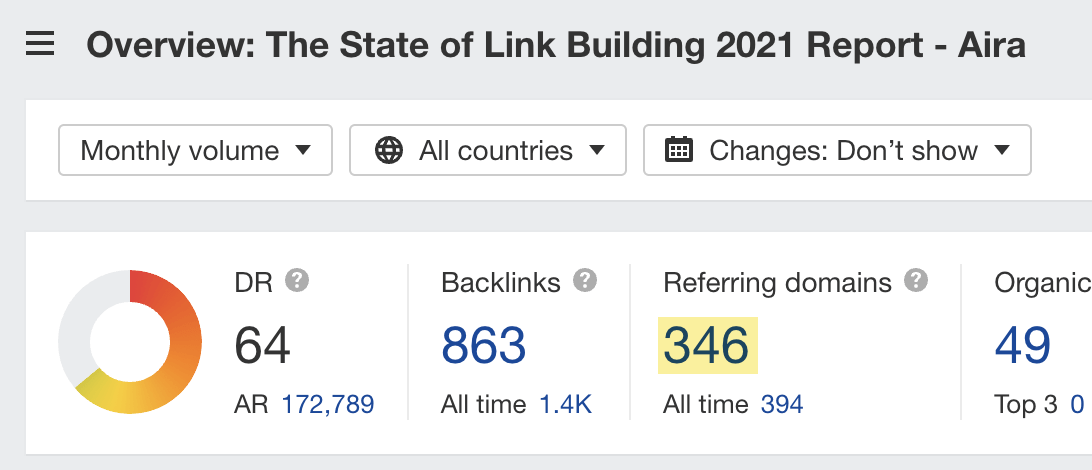
If you’re wondering who to poll for this kind of content, use Content Explorer to find experts who’ve already written about your topic.
For example, here are a few top authors who’ve written about link building (you may notice a familiar name there!):
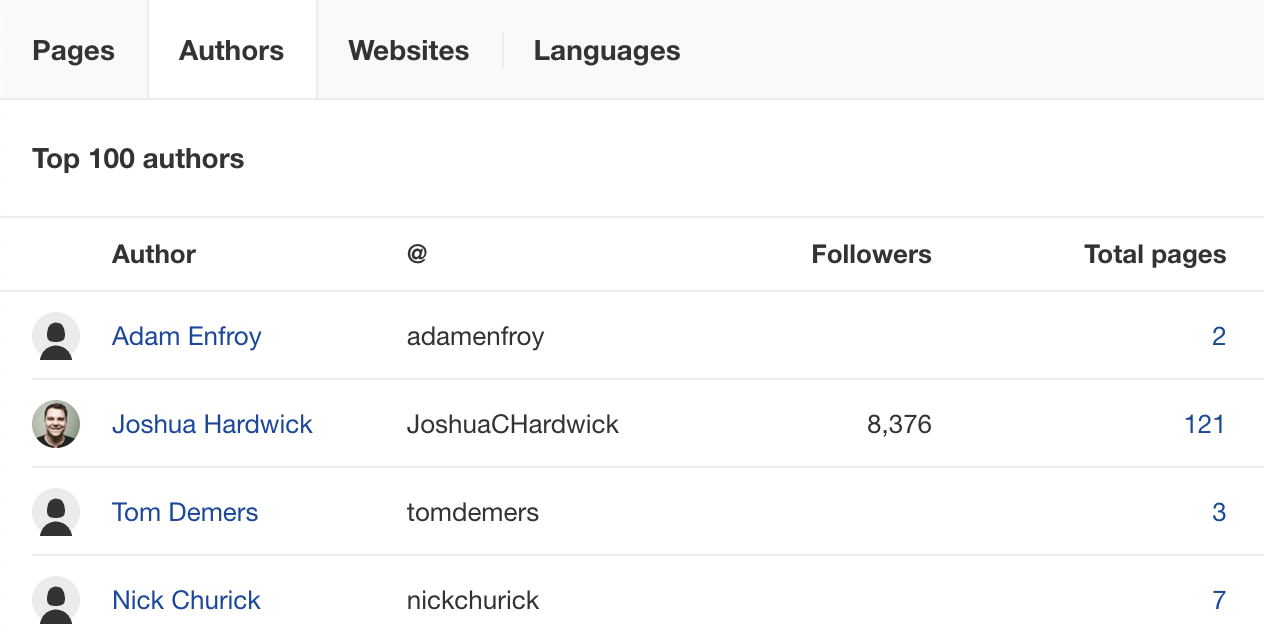
Maximize the link-earning potential of existing posts by adding insights from your poll. For example, we mentioned a statistic from our search traffic study in our keyword research guide, and it earned a few extra backlinks as a result:
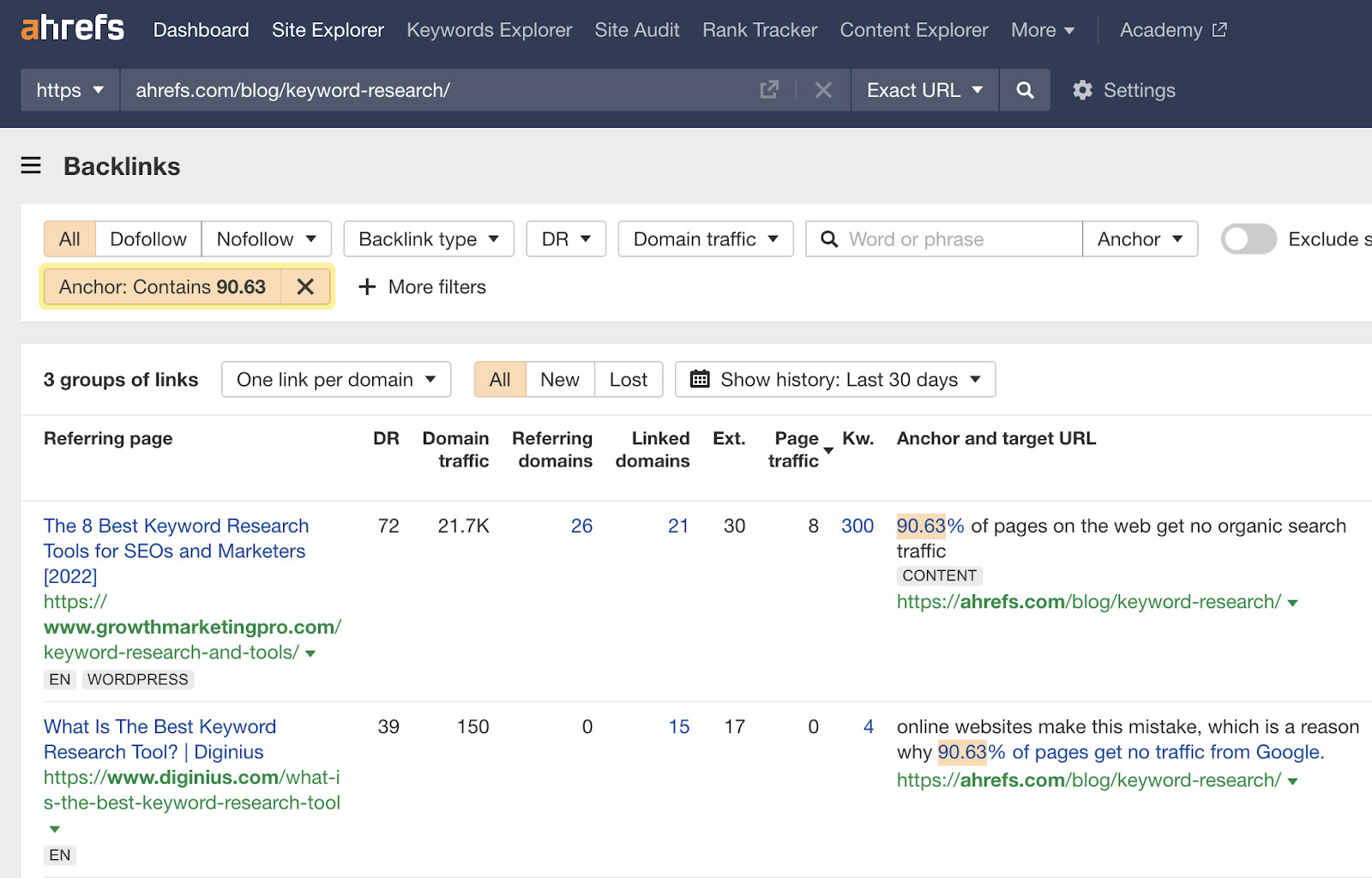
3. Poll experts for product recommendations
Most affiliate websites make their money by ranking for general comparison keywords, i.e., “best [product category].”
Unfortunately, to create truly useful content for these keywords, you usually have to test and review dozens of products yourself. Not only is this costly, but you’re also basing your recommendations on one person’s opinion—which may not align with the consensus of others.
One solution to this is to poll experts for their recommendations.
This is precisely what Robbie Richards did in his post about the “best link building tools.” He asked 82 link builders to vote for their favorite link building tool, tallied up the results, and recommended their favorite to his audience:

You can find general comparison keywords for affiliate sites easily in Ahrefs’ Keywords Explorer. Just enter a few seed keywords (e.g., product types or brands) and then add the word “best” to the “Include” filter.
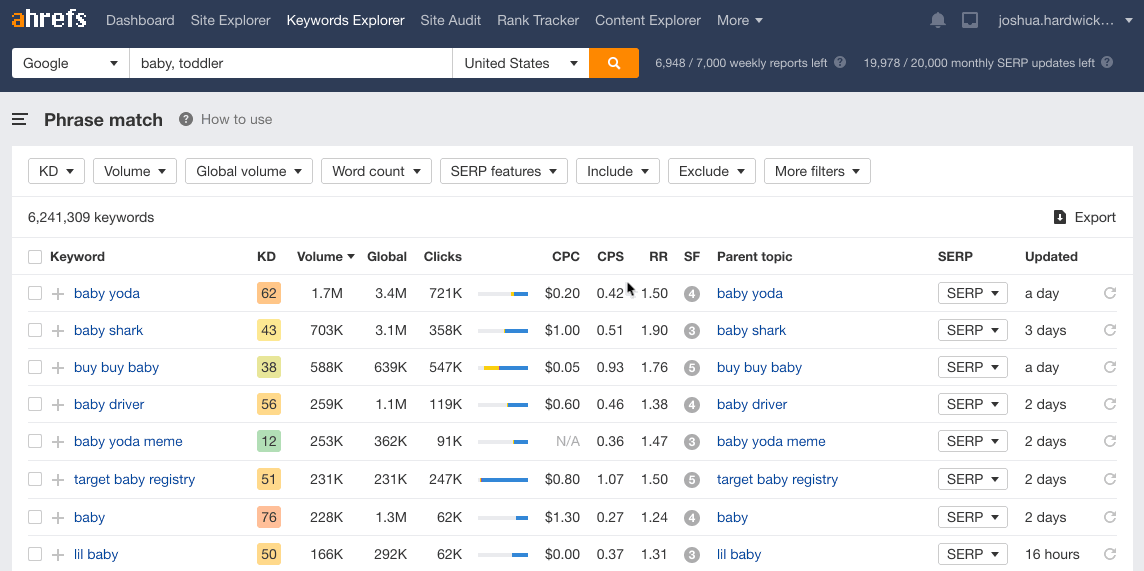
Recommended reading: How to Do Keyword Research for Affiliate Sites
You can use this approach for non-affiliate keywords too.
For example, we polled the 10,000+ SEO professionals in our private Facebook group to compile recommendations for our list of the best free SEO tools.

Final thoughts
Expert roundups, in the traditional sense, are dead unless you have clout. And even then, these roundups are less effective than they once were. But by creatively using experts to source information, you can still apply some of the same principles to enhance your content, earn more backlinks, and get organic traffic.
Got questions? Disagree? Let me know on Twitter.




